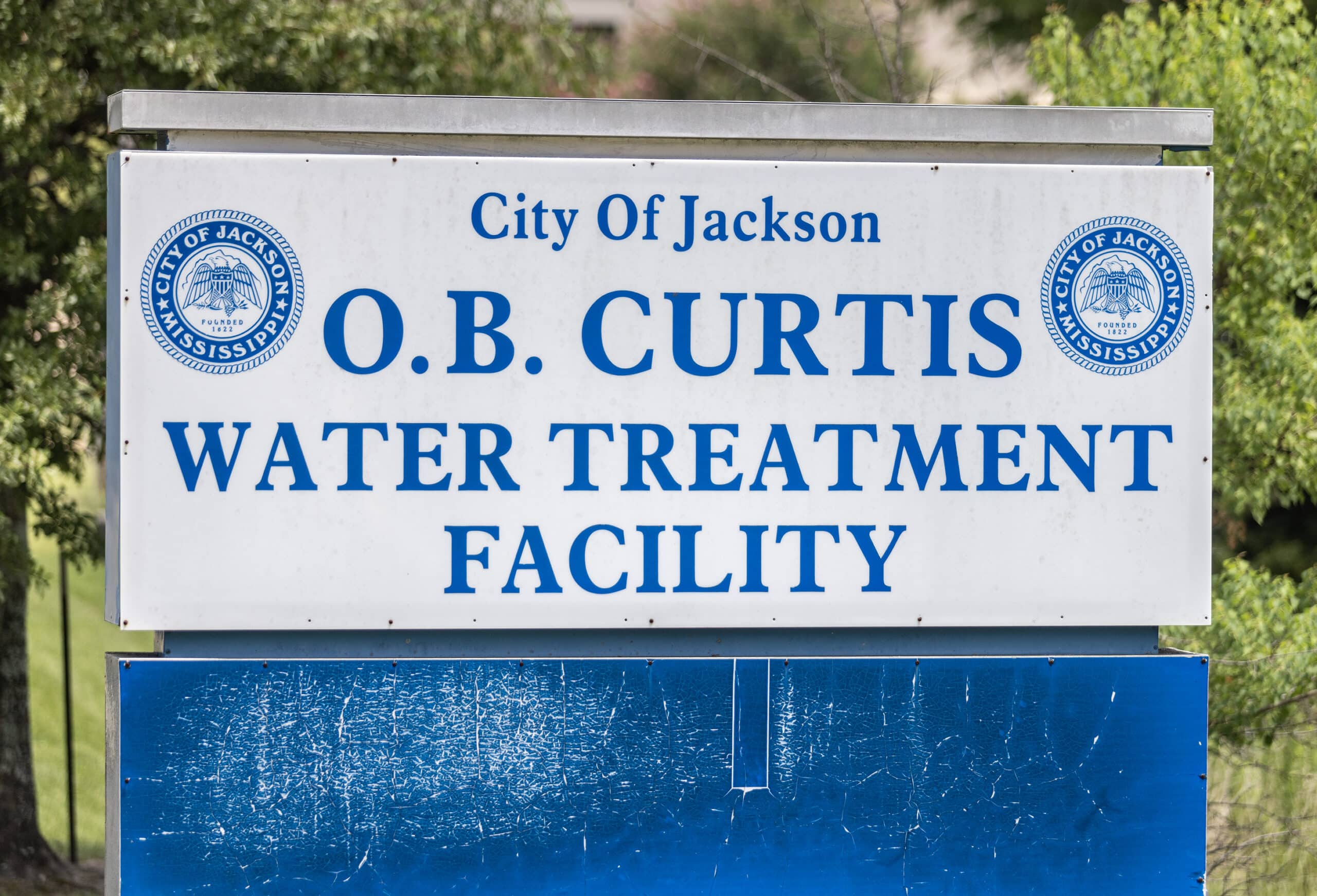Mississippi Today
‘Light years ahead but a long way to go’: A first-year recap of Jackson’s new water management

Neither Rome nor a fully functioning water system in Jackson can be built in a day, but there were plenty of developments from the past year in what has become a face of the country's environmental justice agenda.
In a first-of-its-kind arrangement, the federal government last year – largely via U.S. District Judge Henry Wingate, a Jackson native – vested a historic amount of funding and power into a new, non-government, local water manager, Ted Henifin, and his company, JXN Water.
The arrangement came after decades of underfunding, mismanagement, and loss of revenue that left Jackson's drinking water consistently unreliable for the over 150,000 people it serves.
Henifin was originally only given a year of authority in Wingate's stipulated order last November, but after the judge added Jackson's also-deteriorated sewer system to Henifin's plate this summer, JXN Water is likely to be around for at least another four years.
Shortly after the order, Jackson was allotted over $800 million through different federal funding streams to make water fixes, including $600 million in congressional appropriations. The city received the first $115 million of that pot this summer.
While issues with the system remain – such as figuring out who's going to take over after Henifin, establishing consistent revenue, and replacing the miles of vulnerable, small-diameter water lines – JXN Water has tackled a large swath of Jackson's water issues the city didn't have the capacity to address for years.
“In many ways, the water system is light years ahead of where it was a year ago,” Henifin said at a recent press conference. “But we do have a long way to go.”
Water pressure and safety
Shortly after assuming his new role, Henifin was immediately thrown into the fire. On Christmas morning 2022, freezing weather forced a citywide boil water notice, lasting nearly two weeks.

But water pressure has since remained stable for most of the city, JXN Water reported in its latest quarterly report from Sept. 30 – save for a couple locations in south Jackson: Shannon Dale Road, which was recently converted to a groundwater system, and Merit Health. Hospital; pressure issues at the Henley Young Juvenile Detention Center were recently resolved, Henifin said.
Henifin's team has prioritized finding and fixing new leaks – over 500 repaired so far this year, he estimated – in the aging distribution system, and has so far spent about $12 million on that program, according to quarterly reports, one of the biggest spending areas for JXN Water so far. His staff – led by former Jackson employees Jordan Hillman and Terrence Byrd – also increased flow by finding over 200 valves the city had left shut and switched them on.
One of the goals, Henifin has said, is to build enough reliable pressure where the city can retire the older of its two treatment plants, J.H. Fewell, which was built in 1914.
Jackson's water lines remain vulnerable, though. Henifin had planned to start replacing the over 100 miles of small diameter pipes this summer, but the project got pushed back to early 2024, he said. He estimated it could take anywhere from five to 10 years to finish.
Since April, JXN Water's issued 74 boil water notices, though no citywide ones since the one issued last Christmas. Some of those recent notices, the company said, happened because of the extensive drought Mississippi saw, which caused soil to dry up and contract around the city's water lines.
Henifin has consistently said the water leaving the plant is safe to drink, and he found himself several times defending the water's safety to skeptical residents who have lost trust over the years.
Public reception
In June, Jackson officials held a press conference announcing free water filters for pregnant women and children. Both Henifin and Wingate questioned the need for those filters, as well as comments Mayor Chokwe Antar Lumumba made at the event. The confusion largely stemmed from a public notice the state Health Department requires the city to release because of a failed lead test in 2016.
The city's water has passed those tests ever since, but state regulations require a corrosion control system to be in place before the city can stop sending the notices. JXN Water estimated that the fix will be fully in place by next March.
While water leaving the plant is safe, residents have long had issues trusting what comes out of their taps. As advocates who spoke to Wingate over the summer said, homes with older plumbing are susceptible to contaminants like lead, and often get colored or odorous water. JXN Water has a project to find and replace any existing lead service lines – the ones that connect home plumbing to the city's lines – but estimates that it could take up to 10 years.
Those advocacy groups – including the Mississippi Poor People's Campaign and the People's Advocacy Institute – urged Wingate for more local inclusion in decision-making, as well as communication around issues like boil water notices. The judge denied their requests, instead praising JXN Water's work so far. The groups then filed motions to intervene in the case in September, to which Wingate hasn't responded.
Public feedback on JXN Water has largely been positive otherwise. During a public comment period about the company taking charge of the city's sewer system, 95% of the over 600 responses supported the takeover – which became official in September – many of them expressing new confidence in their tap water.
Building trust with residents was an early goal for Henifin, but he said JXN Water could've done more early on with its public messaging.
“We were so focused on just getting water to folks, we didn't spend adequate time (educating the public),” he said, adding that even some of his staff didn't want to drink straight from the city's taps when he first got there. “We're all about trying to restore trust in the water… I believe it takes some time to show that you're walking the walk before people can really start trusting you.”
The company has since contracted with a call center in Rankin County, ProTel Inc., which JXN Water says has dramatically reduced wait times for residents.
Lumumba – who long said that the city's water system needed an immense cash infusion to get back on its feet – agreed that the system has come a long way in the last year.
“I think that there has been a great deal of progress,” he said at a recent press conference. “There have been a number of improvements at our water treatment facilities.”
The mayor also echoed that “there's still a long way to go,” warning that the city's small-diameter lines throughout the city remain vulnerable to the cold weather.
“Prayerfully, we have a relatively calm winter and we don't experience any challenges,” Lumumba said.
New billing system
Shortly after coming into his role, Henifin called for changing the way Jacksonians pay for water, citing the city's extremely low collection rate of just around 50% at the time, compared to at least 90% for most utilities in the country.
His first idea was to charge residents based on property values, but the state Legislature responded by outlawing water bills not based on consumption. Pivoting, Henifin instead announced a new tiered billing system, which raises costs for most but reduces them for low-income customers.
Henifin said he's hoping to get approval from Jackson's City Council. Legally though, he can implement the plan regardless, part of the broad authority Wingate's order gave him (in addition to freeing JXN Water from public record and procurement laws because of its status as a non-government entity).
Lumumba said he saw the proposal, but declined to take a stance on it. But if it goes into effect, JXN Water would be the first utility in the U.S. to use separate water rates for people on the Supplemental Nutrition Assistance Program, or SNAP.
Henifin drew his first idea, using property values, from Jackson's poor experience with water meters, a problem that started about a decade ago after Siemens put in a faulty system. The city recently began replacing the meters, and JXN Water said in its September report that the project is over 80% done.

In the aftermath of the meter issues, thousands of residents complained about inaccurate bills, and JXN Water said it inherited $56 million in disputed debts when it took over. To resolve those, the company used federal funding to remove over $19 million in debt from over 8,000 accounts. JXN Water wrote in its report that, while it could still pursue those debts in the future, doing so would likely cost more than what money it collects.
Henifin has also said recently that the company will start shutting off connections to homes who don't pay their water bills, although that likely wouldn't begin until after the holidays.
Staffing and other projects
One of JXN Water's biggest expenditures so far was contracting the engineering firm Jacobs Solutions to staff and manage the city's two water treatment plants. The initial contract was for six months, but Henifin plans to extend the deal to 10 years. Jacobs has so far received roughly $19 million, by far JXN Water's largest contract to date.
The treatment plants themselves are also in more stable condition. Past harsh winters, especially in 2021, proved too much for the plants, which in Jackson, like in many Southern cities, has much of its equipment exposed to the outdoors. JXN Water and Jacobs are nearly finished winterizing the plants, according to the September quarterly report, having added new insulation and heat tracing. The project is scheduled to be done by the end of this year, the report said.
Another priority for the company is retiring the gaseous chlorine system used at the primary treatment plant, O.B. Curtis, which it aims to do by the end of 2024. While chlorine gas is a common tool in water treatment, many places are phasing it out due to long-term health concerns.
As far as what's to come next for JXN Water, Henifin said he'll be in the capital city until at least 2027 because of his new sewer duties. But he said he hopes to be in a more remote role by then, and to have some sort of transition plan for the management of Jackson's water in place by 2025.
This article first appeared on Mississippi Today and is republished here under a Creative Commons license.
Did you miss our previous article…
https://www.biloxinewsevents.com/?p=316031
Mississippi Today
On this day in 1896


MAY 18, 1896

The U.S. Supreme Court ruled 7-1 in Plessy v. Ferguson that racial segregation on railroads or similar public places was constitutional, forging the “separate but equal” doctrine that remained in place until 1954.
In his dissent that would foreshadow the ruling six decades later in Brown v. Board of Education, Justice John Marshall Harlan wrote that “separate but equal” rail cars were aimed at discriminating against Black Americans.
“In the view of the Constitution, in the eye of the law, there is in this country no superior, dominant, ruling class of citizens,” he wrote. “Our Constitution in color-blind and neither knows nor tolerates classes among citizens. In respect of civil rights, all citizens are equal before the law. The humblest is the peer of the most powerful. The law … takes no account of his surroundings or of his color when his civil rights as guaranteed by the supreme law of the land are involved.”
This article first appeared on Mississippi Today and is republished here under a Creative Commons license.
Did you miss our previous article…
https://www.biloxinewsevents.com/?p=359301
Mississippi Today
Renada Stovall, chemist and entrepreneur
Renada Stovall sat on the back deck of her rural Arkansas home one evening, contemplating life when she had a life-altering epiphany…
“I gotta get out of these woods.”
She heard it as clear as lips to her ear and as deep as the trees surrounding her property. Stovall's job as a chemist had taken her all over the country. In addition to Arkansas, there were stints in Atlanta, Dallas and Reno. But she was missing home, her parents and friends. She also knew, she needed something else to do.
“I thought, what kind of business can I start for myself,” said Stovall, as she watered herbs growing in a garden behind her south Jackson home. Some of those herbs are used in her all-natural products. “I know when I lived in Reno, Nevada, where it's very hot and very dry, there really weren't products available that worked for me, my hair, and my skin suffered. I've got a chemistry degree from Spelman College. I took the plunge and decided to create products for myself.”

In 2018, Stovall's venture led to the creation of shea butter moisturizers and natural soaps. But she didn't stop there, and in December 2022, she moved home to Mississippi and got to work, expanding her product line to include body balms and butters, and shampoos infused with avocado and palm, mango butter, coconut and olive oils.
Nadabutter, which incorporates Renada's name, came to fruition.

Stovall sells her balms and moisturizers at what she calls, “pop-up markets,” across the state during the summer. She's available via social media and also creates products depending on what of her ingredients a customer chooses. “My turmeric and honey is really popular,” Stovall added.
“The all-natural ingredients I use are great for conditioning the skin and hair. All of my products make you feel soft and luscious. The shea butter I use comes from West Africa. It's my way of networking and supporting other women. And it's my wish that other women can be inspired to be self-sufficient in starting their own businesses.”





This article first appeared on Mississippi Today and is republished here under a Creative Commons license.
Mississippi Today
On this day in 1954
MAY 17, 1954

In Brown v. Board of Education and Bolling v. Sharpe, the U.S. Supreme Court unanimously ruled that the “separate but equal” doctrine in Plessy v. Ferguson was unconstitutional under the 14th Amendment, which guaranteed equal treatment under the law.
The historic decision brought an end to federal tolerance of racial segregation, ruling in the case of student Linda Brown, who was denied admission to her local elementary school in Topeka, Kansas, because of the color of her skin.
In Mississippi, segregationist leaders called the day “Black Monday” and took up the charge of the just-created white Citizens' Council to preserve racial segregation at all costs.
This article first appeared on Mississippi Today and is republished here under a Creative Commons license.
-
SuperTalk FM6 days ago
Martin Lawrence making 3 stops in Mississippi on comedy tour
-
Our Mississippi Home5 days ago
Beat the Heat with Mississippi’s Best Waterparks
-
SuperTalk FM2 days ago
State auditor cracking down on Mississippians receiving unemployment benefits
-
Our Mississippi Home5 days ago
Charlie’s U-Pik: Opening Soon for the Summer Season
-
Mississippi News Video4 days ago
Jackson has a gang problem
-
Kaiser Health News5 days ago
Medicaid ‘Unwinding’ Decried as Biased Against Disabled People
-
228Sports4 days ago
George County Pours Runs In 6A South State Title Victory At PRC
-
Mississippi Today3 days ago
On this day in 1950













































